Related Research Articles
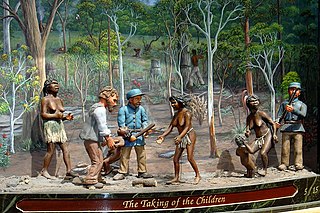
The Stolen Generations were the children of Australian Aboriginal and Torres Strait Islander descent who were removed from their families by the Australian federal and state government agencies and church missions, under acts of their respective parliaments. The removals of those referred to as "half-caste" children were conducted in the period between approximately 1905 and 1967, although in some places mixed-race children were still being taken into the 1970s.

Woollarawarre Bennelong, also spelt Baneelon, was a senior man of the Eora, an Aboriginal Australian people of the Port Jackson area, at the time of the first British settlement in Australia in 1788. Bennelong served as an interlocutor between the Eora and the British, both in the colony of New South Wales and in the United Kingdom.
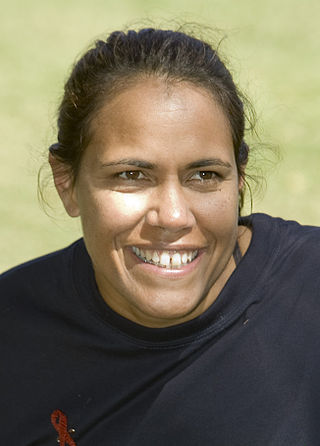
Catherine Astrid Salome Freeman is an Aboriginal Australian former sprinter, who specialised in the 400 metres event. Her personal best of 48.63 seconds currently ranks her as the ninth-fastest woman of all time, set while finishing second to Marie-José Pérec's number-four time at the 1996 Olympics. She became the Olympic champion for the women's 400 metres at the 2000 Summer Olympics, at which she lit the Olympic Flame.

Keith Windschuttle is an Australian historian. He was appointed to the board of the Australian Broadcasting Corporation in 2006. He was editor of Quadrant from 2007 to 2015 when he became chair of the board and editor-in-chief. He was the publisher of Macleay Press which operated from 1994 to 2010.
Dr Ron Brunton is an Australian anthropologist. He was the director of Encompass Research Pty Ltd, and was on the Board of the public broadcaster, the Australian Broadcasting Corporation (ABC) for a five-year term from 1 May 2003.

Linda Jean Burney is an Australian politician and is an Australian Labor Party member of the Australian House of Representatives, representing Barton since the 2016 federal election. She is Minister for Indigenous Australians in the Albanese ministry, and the first woman who identifies as Aboriginal to serve in that position.
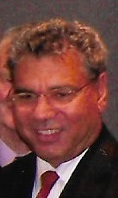
Nyunggai Warren Stephen Mundine is an Australian Aboriginal leader and politician. He was the National President of the Australian Labor Party (ALP), but quit the party in 2012. Mundine was appointed chairman of the Coalition government's Indigenous Advisory Council by then-prime minister, Tony Abbott.

The Hindmarsh Island bridge controversy was a 1990s Australian legal and political controversy that involved the clash of local Aboriginal Australian sacred culture and property rights. A proposed bridge to Hindmarsh Island, near Goolwa, South Australia attracted opposition from many local residents, environmental groups and indigenous leaders. In 1994, a group of Ngarrindjeri women elders claimed the site was sacred to them for reasons that could not be revealed. The case attracted much controversy because the issue intersected with broader concerns about Indigenous rights, specifically Aboriginal land rights, in the Australian community at the time, and coincided with the Mabo and Wik High Court cases regarding Native title in Australia.

The Hindmarsh Island Royal Commission was a Royal Commission into the nature of female Aboriginal religious beliefs relating to Goolwa and Hindmarsh Island in South Australia that was triggered by the Hindmarsh Island bridge controversy.
Barangaroo was the second wife of Bennelong, who was interlocutor between the Aboriginal people and the early British colonists in New South Wales. Barangaroo was a member of the Cammeraygal clan. While Bennelong spent considerable time in the British settlement in Sydney, Barangaroo maintained her way of life with her people.
Diane Robin (Di) Bell is an Australian feminist anthropologist, author and activist. She is Professor Emerita of Anthropology at the George Washington University in Washington, D.C, USA and Distinguished Honorary Professor of Anthropology at the Australian National University, Canberra. Her work focuses on the Aboriginal people of Australia, Indigenous land rights, human rights, Indigenous religions, violence against women, and on environmental issues.

John Joseph Herron was an Australian politician, ambassador and surgeon who was a Liberal member of the Australian Senate from 1990 to 2002, representing Queensland. From 1996 to 2001 he was the Minister for Aboriginal and Torres Strait Islander Affairs. From 2002 to 2006 he was the Australian Ambassador to Ireland and the Holy See.
Sue Gordon is an Aboriginal retired magistrate from Western Australia who has been locally and nationally honoured for her work with Aboriginal people and in community affairs. She is known for being chair of the Gordon Inquiry in 2002.
Indigenous Australians or Australian First Nations are people with familial heritage from, and membership in, the ethnic groups that lived in Australia before British colonisation. They consist of two distinct groups: the Aboriginal peoples of the Australian mainland and Tasmania, and the Torres Strait Islander peoples from the seas between Queensland and Papua New Guinea. The term Aboriginal and Torres Strait Islander peoples or the person's specific cultural group, is often preferred, though the terms First Nations of Australia, First Peoples of Australia and First Australians are also increasingly common; 812,728 people self-identified as being of Aboriginal and/or Torres Strait Islander origin in the 2021 Australian Census, representing 3.2% of the total population of Australia. Of these Indigenous Australians, 91.4% identified as Aboriginal; 4.2% identified as Torres Strait Islander; while 4.4% identified with both groups. Since 1995, the Australian Aboriginal flag and the Torres Strait Islander flag have been among the official flags of Australia.
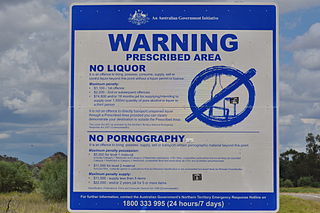
The Northern Territory National Emergency Response, also known as "The Intervention" or the Northern Territory Intervention, and sometimes the abbreviation "NTER" was a package of measures enforced by legislation affecting Indigenous Australians in the Northern Territory (NT) of Australia, which lasted from 2007 until 2012. The measures included restrictions on the consumption of alcohol and pornography, changes to welfare payments, and changes to the delivery and management of education, employment and health services in the Territory.
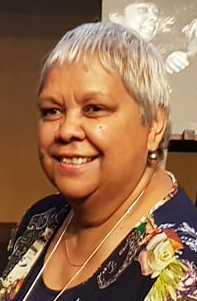
Jacqueline Gail "Jackie" Huggins is an Aboriginal Australian author, historian, academic and advocate for the rights of Indigenous Australians. She is a Bidjara/Pitjara, Birri Gubba and Juru woman from Queensland.
Bess Nungarrayi Price is an Aboriginal Australian activist and politician. She was a Country Liberal Party member of the Northern Territory Legislative Assembly from 2012 to 2016, representing the electorate of Stuart, and was Minister for Community Services in the Giles Ministry. She lives in Alice Springs in Central Australia, in the Northern Territory.
Indigenous Australians are both convicted of crimes and imprisoned at a disproportionately higher rate in Australia, as well as being over-represented as victims of crime. As of September 2019, Aboriginal and Torres Strait Islander prisoners represented 28% of the total adult prisoner population, while accounting for 2% of the general adult population. Various explanations have been given for this over-representation, both historical and more recent. Federal and state governments and Indigenous groups have responded with various analyses, programs and measures.
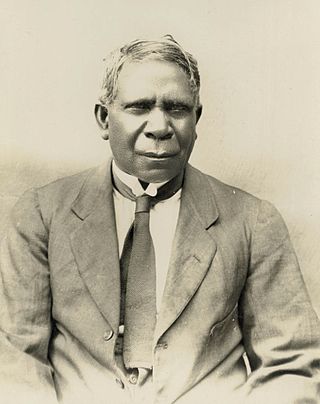
Indigenous Australian literature is the fiction, plays, poems, essays and other works authored by Aboriginal and Torres Strait Islander people of Australia.
References
- ↑ Howson, Peter (2001). "The Objectives of the Bennelong Society". Institute for Private Enterprise. Archived from the original on 19 August 2001. Retrieved 15 August 2006.
- ↑ Altman, Jon (2005). "The Indigenous hybrid economy". 2005 Conference papers. Australian Fabian Society. Archived from the original on 23 August 2006. Retrieved 15 August 2006.
- ↑ Graham, Chris (2006). "Teaching Indigenous culture at school". Crikey. Archived from the original on 15 July 2006. Retrieved 15 August 2006.
- ↑ Herron, John (6 July 2001). "The Bennelong Society is dedicated to acting for Indigenous interests". On Line Opinion. Retrieved 27 January 2023.
- ↑ Ferguson, John (22 November 2011). "Lack of interest kills Bennelong Society". The Australian. Archived from the original on 22 November 2011. Retrieved 10 June 2022.
- ↑ "Bennelong Papers". Quadrant Online. Retrieved 10 June 2022.
- ↑ "Recipients of the Bennelong Medal". Bennelong Society. 3 March 2012. Archived from the original on 3 March 2012. Retrieved 23 January 2023.